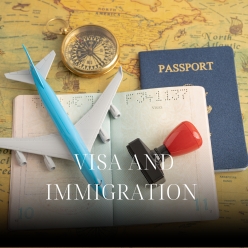When planning an international trip, understanding the visa and immigration laws of your destination is crucial. These laws vary widely from country to country, and failing to comply can lead to entry denial or legal issues during your stay. This guide will help you navigate the complexities of visa and immigration laws for some of the most popular travel destinations, ensuring a smooth and hassle-free journey. Learning more with visa.javanet247
1. What Are Visa and Immigration Laws?
Visa and immigration laws govern the entry, stay, and exit of foreign nationals in a country. A visa is an official document or stamp in your passport that grants you permission to enter a country for a specified period and purpose, such as tourism, business, or study. Immigration laws include the broader regulations that manage how foreigners can reside, work, or become permanent residents.
2. Importance of Understanding Visa and Immigration Laws
Understanding the visa and immigration laws of your destination is essential for several reasons:
- Compliance: Ensuring that you meet all entry requirements to avoid being denied entry or deported.
- Travel Planning: Knowing how long you can stay and under what conditions helps in planning your itinerary.
- Legal Protection: Being aware of your rights and obligations as a foreign visitor.
3. Visa Requirements for Popular Travel Destinations
Visa requirements can vary based on your nationality, the purpose of your visit, and the duration of your stay. Here’s an overview of visa requirements for some popular travel destinations:
- United States: Most travelers need a visa to enter the U.S., except for citizens of Visa Waiver Program (VWP) countries who can stay for up to 90 days without a visa. Business (B-1) and tourism (B-2) visas are common.
- European Union (Schengen Area): Travelers from many countries need a Schengen visa to enter the EU for short stays up to 90 days. The visa allows access to multiple Schengen countries without border checks.
- Australia: Visitors typically need an Electronic Travel Authority (ETA) or eVisitor visa for short stays. Australia has strict immigration laws, so ensure you meet all requirements.
- Canada: Most travelers need a visa or an Electronic Travel Authorization (eTA) to enter Canada. U.S. citizens and residents may have different entry requirements.
- Japan: Japan offers visa exemptions for citizens of many countries for short-term visits. However, some nationalities require a visa, and the requirements can differ based on the visit’s purpose.
- United Arab Emirates: The UAE offers visa-free entry for citizens of several countries. Others can obtain a visa on arrival or apply for an eVisa before travel.
4. Key Points in Immigration Laws for Travelers
- Duration of Stay: Most countries have a limit on how long you can stay on a tourist visa, typically 30 to 90 days. Overstaying can result in fines, deportation, or future entry bans.
- Work and Study Restrictions: Tourist visas generally do not allow you to work or study. If you plan to work or study, ensure you obtain the appropriate visa.
- Renewal and Extension: Some countries allow you to extend your stay beyond the initial visa period, but this usually requires applying before your current visa expires.
- Entry and Exit Regulations: Immigration laws often require you to provide proof of onward travel or sufficient funds for your stay. Be prepared to show these documents at the border.
5. Common Pitfalls and How to Avoid Them
- Not Checking Visa Requirements: Always verify visa requirements well in advance of your trip. Each country has different rules, and they can change frequently.
- Ignoring Visa Validity and Conditions: Pay attention to the visa’s validity period and any conditions, such as restricted areas you cannot visit.
- Failing to Keep Documentation: Always carry copies of your visa and related documents. In some countries, authorities may request to see your visa at any time.
6. Tips for Navigating Visa and Immigration Processes
- Apply Early: Visa processing times can vary, so apply well before your travel dates. Some visas can take weeks or even months to process.
- Use Official Sources: Always use official government websites or authorized visa processing centers to apply for visas. Beware of scams or fraudulent services.
- Understand Immigration Procedures: Familiarize yourself with the immigration procedures at your destination airport, including customs regulations and declaration forms.
Conclusion
Understanding visa and immigration laws is essential for any international traveler. By being informed about the specific requirements of your destination, you can avoid potential issues and ensure a smooth travel experience. Always check the latest information from official sources before your trip, and plan ahead to meet all necessary visa and immigration requirements.

